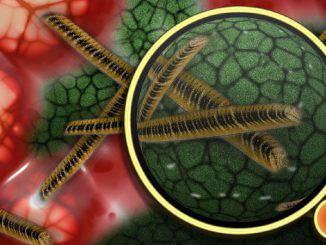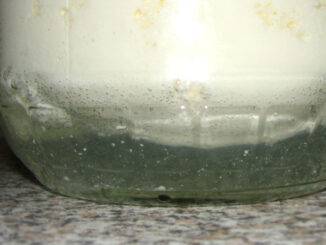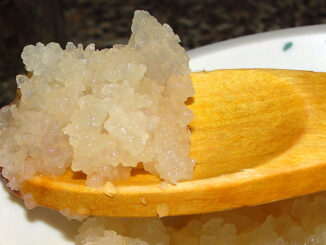
As a potent probiotic, Kefir is often used as a better replacement for yogurt. Its diverse beneficial effects far exceed the advantages of yogurt. But what about the impact of Kefir on our hair?
The first thing you will hear about Kefir will undoubtedly be that it introduces a harmonious bacterial balance in our guts, ensuring a healthy intestinal microbiome that positively impacts many aspects of our health.
One of the most visible and persuasive outcomes of Kefir is its impact on the skin.
Continuous consumption of Kefir makes the skin soft, smooth, silky, and young-looking. Kefir moisturizes and rejuvenates the skin, improves its turgor, and provides a series of valuable ingredients for its nutrition. This phenomenon is widely known as “Kefir skin“.
As an integral part of the skin, the hair inevitably gets affected by all the beneficial effects of Kefir. These effects may come from either the internal use of Kefir by drinking it or its external use by directly applying kefir masks on the hair.
Internal use of Kefir (drinking Kefir)
The internal use of Kefir positively affect the hair in at least two ways:
- Through its probiotic properties
- Through its nutritional virtues
Hair benefits from Kefir’s probiotic properties
The right microbial balance in our guts is a proven factor affecting many aspects of our health. These aspects include tumor suppression and prevention, improved immunity, allergy control, a series of wound-healing and anti-inflammatory effects, a decrease in cholesterol and blood sugar levels, and numerous antimicrobial effects.
It is no surprise that all these beneficial effects of Kefir on our entire body also directly impact the health of our hair.
Kefir positively impacts many adverse hair conditions like weak and brittle hair, dry scalp, split ends, and seborrhea by maintaining the proper bacterial balance in your gastrointestinal tract.
Kefir’s probiotics can also help with hair loss, as hair loss is usually a result of internal hormonal disbalance, that Kefir usually reverts to normal.
Hair benefits from Kefir’s nutritional values
Kefir is packed with dietary minerals, protein, vitamins, and essential amino acids that directly contribute to the health of your hair.
The minerals found in Kefir, including calcium, phosphorus, magnesium, potassium, sodium, copper, zinc, and many others, play an important key role in the regeneration of cells, help with hair growth, and prevent hair loss by making hair follicles more robust and healthier.
The vitamins A, B, C, D, and E, found in Kefir are also recommended for fighting hair loss and baldness. The presence of vitamin E and potassium in Kefir is particularly important for the body’s ability to maintain a healthy moisture balance of the scalp.
Another important asset of Kefir is the essential amino acids it contains. To name a few, Kefir contains methionine, cysteine, tryptophan, phenylalanine, tyrosine, leucine, threonine, lysine, and many others. Most of these amino acids help in the prevention of hair loss, stimulation of hair growth, and the prevention of scalp and follicles dehydration.
External use of Kefir (direct hair application)
The ability of Kefir to be directly applied to the skin and hair is amongst its most distinctive assets. And yes, to take advantage of the entire myriad of Kefir benefits, you can not only consume Kefir but also directly apply it to your skin, scalp, or hair.
Direct application of Kefir on the hair and scalp through hair masks has an almost immediate but lasting effect. It reduces symptoms of seborrhea (dandruff) and eliminates itchiness. Kefir masks also actively nourish the hair follicles and thus makes the hair stronger and relieve split ends.
One of the most exciting effects of Kefir hair masks is that they positively affect both dry and greasy hair. Kefir not only reduces excess oil in follicles but also nourishes and moisturizes them, making your hair soft, smooth, silky, and supple.
Easy Kefir hair mask recipes
In general, making a Kefir hair mask is easy. You just have to put together a protein-rich food such as eggs and mix it with your milk Kefir. It is a good idea to apply the masks at bedtime or during weekends and add a little essential oil (such as lavender oil) to reduce the smell of fermentation Kefir may have.
Before applying the mask, it may be a good idea to warm it up to a comfortable temperature. Apply the fresh mask to the hair, wrap your head with a towel, leave it for 30-40 minutes, then gently rinse the hair with lukewarm water. If needed, use organic shampoo to wash off any excess of the mask.
However, note that the level of fermentation of Kefir is essential for the quality of your Kefir mask. For direct skin and hair application, it is recommended to use fresh to medium fermented Kefir.
While Kefir that has fermented longer is more probiotic-rich, it may be too acidic and aggressive for your hair or skin of your scalp. Avoid using over-fermented Kefir for direct skin applications unless you know what you’re doing.
Kefir mask for dry hair
- 3 tbsps of Kefir
- 1 tbsp of castor oil
- 1 tbsp of burdock oil
- 1 tbsp of olive oil
- 1 egg yolk
Kefir mask for greasy hair
- 1 tbsp of blue clay
- 1 teacup of Kefir
- 3-4 drops of rosemary essential oil
Kefir mask against hair loss
- 1 teaspoon of fresh yeast
- 2 tablespoons of onion juice
- 1 teacup of milk kefir
Kefir mask for itchy scalp
- 1 teaspoon of fresh yeast
- 1/2 teacup of full-fat milk kefir
- 1 tbsp of honey
Summary
Кefir can have beneficial effects on the hair both by its internal use and direct application to the hair and scalp. The internal use (drinking) of Kefir positively affects the hair in two ways: through its probiotic properties and its nutritional virtues.
Kefir has positive impacts on many hair conditions, including weak and brittle hair, dry scalp, split ends, and seborrhea. Its probiotics can also help with hair loss and stimulate hair growth.
You can also apply Kefir externally through direct skin applications and hair masks. The presence of many vitamins, minerals, and essential amino acids in Kefir reduces symptoms of seborrhea (dandruff), eliminates scalp itchiness, and actively nourishes the hair follicles making the hair stronger and healthier.
Related questions
- Can I make Kefir hair masks with natural Kefir only, without adding any other ingredients? Yes. Freshly fermented Kefir can be used as a standalone hair care product for direct application. However, you should be careful with over-fermented Kefir, as it may be too acidic and aggressive for your hair and irritate your scalp.
- Can Water Kefir be used for hair masks? No. The probiotic content and healing properties of water Kefir are far inferior compared to milk Kefir. Therefore only the use of milk Kefir is advised as a skin and hair care product.



